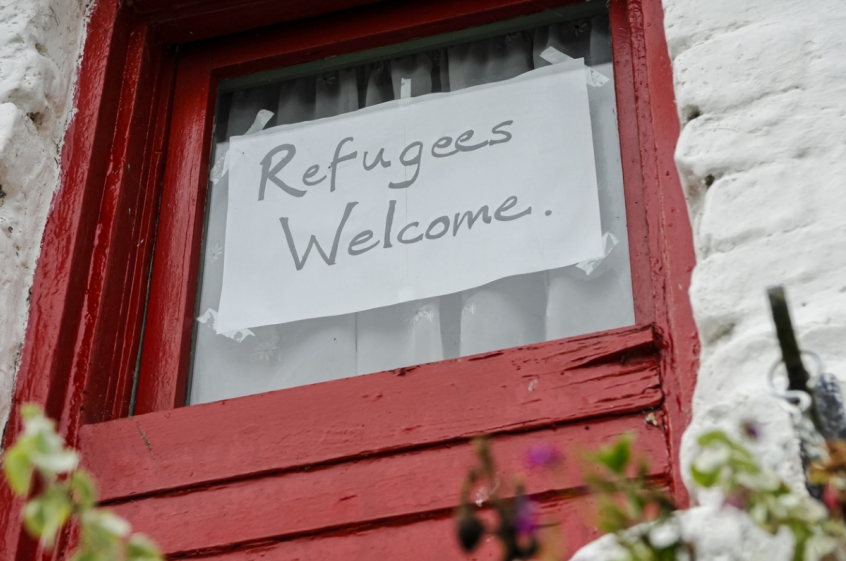
It may well be that your heart was broken, as mine was, by the news that at least 27 people had drowned in the English Channel while trying to reach the UK.
But I wonder whether for you, as also for me, that event already seems like quite a long time ago – whereas in reality it is only a matter of days. News moves fast with the internet and 24-hour TV stations – and now we have Omicron to pre-occupy us, not to mention the gut-churning murder of Arthur Labinjo-Hughes, Storm Arwen, and, of course, Christmas.
But maybe we should just stop. And think. And pray. And not move on so fast – important though these other things are. The UN reports that 'ever-increasing numbers of people are attempting the journey [across the Channel] in small, unseaworthy boats as they flee conflict or poverty or persecution in Afghanistan, Sudan, Iraq, Eritrea and elsewhere'.
Did you know, for example, that on one day alone in November – Thursday 11<sup>th – 1,185 people crossed the channel to England? And three did not make it; they drowned.
The US, likewise, has many people wanting to enter, with all the issues in relation to the southern border that this has created. On 27 September, the US Department of State announced that the government plans to increase the number of refugees allowed into the US to 125,000 for the fiscal year that began on 1 October.
As evangelicals, as people of Scripture, we go back to the Bible when thinking about these things. Ten years ago the noted US pastor, theologian and writer Tim Keller wrote a book called Generous Justice. In it, citing Zechariah 7v10-11, he highlights a "quartet of the vulnerable" repeated throughout the Bible – "the widow, the fatherless, the immigrant... the poor." (He translates the Hebrew word gare as "immigrant" rather than "foreigner" or "alien" as is more common, saying it "more accurately conveys to modern readers the meaning of the word.")
And the immigrant, Tim Keller says, is someone repeatedly highlighted in the Old Testament as one to whom justice is due. Indeed, such justice is not optional. A failure to provide justice towards such vulnerable people is "a sin, offensive to God's splendour [Job 31v23] and deserving of judgment and punishment [Job 31v28]," he writes.
Keller also says that Matthew 25 implies Christians should "invite in" immigrants and refugees. Jesus' intention was that they were "not merely to be sent to a shelter but were to be welcomed into the disciples' homes and lives, and, it is implied, given advocacy, friendship, and the basics for pursuing a new life in society".
I find this very challenging. And maybe all of us who call ourselves evangelicals in the UK and the US have much to ponder. For let's be honest, while we may find individual news stories very moving, our record in terms of words and deeds is somewhat patchy.
It's true that there are some evangelical figures and groups who have given a good lead on this: in Britain we might think of Krish Kandiah, and Rob James of the Welsh Evangelical Alliance. Moreover, the Welcome Network has more than 700 churches proactively offering a welcome to refugees and asylum seekers. In the States we might think of Franklin Graham and the work of Samaritan's Purse. The US also has the Evangelical Immigration Table, a group of nine evangelical organisations working together on the issue.
So we are not silent, nor inactive. And yet... and yet... I wonder if we are as clear on all this as we might be; whether as an issue it has a truly Biblical priority among us in the way that, say, issues of sexuality and gender do. I've been inspired by Pope Francis, who has not only met and prayed with dozens of migrants in Cyprus while on a visit there in the last few days, and denounced some of the centres in which they are held as "real concentration camps" – but has also offered 50 of them the chance to move to Italy by the end of the year. In the UK, the Bishop of Bradwell, Dr John Perumbalath, who chairs the Churches Refugee Network, has also spoken out boldly.
The question is: are we evangelicals as strong on this issue as the Scriptures encourage us to be? If not, why? And if we want to do better, what do we do about it? Underlying all this, is, of course, an ongoing debate about the relationship between the gospel and social action. There is no space to explore all that in huge detail here, but it is superbly examined in an article by the late Melvin Tinker for the Gospel Coalition here.
What can we practically do? One very practical, easy thing is to download the Share The Meal app (available on both Apple and Android). This is an initiative of the United Nations World Food Programme (WFP), the world's largest humanitarian agency fighting hunger. In the app, you will find news about some of the most dire situations in the world, and how you can help. In the next five minutes you could download it, donate to it, and share it.
Secondly, I was inspired recently by a young couple who moved away from our church to another part of the country. In their new location, accommodation was being provided, so they contacted the local authority here and offered their existing house, which they own, as a residence for refugees and asylum seekers. The offer was accepted with alacrity. A Syrian family is moving in. I was impressed. If I ever suddenly received enough money to buy a house, that is something I would love to do. But perhaps you are already in a position to do so... Worth praying about?
Finally, and most importantly, we can pray and let Scripture shape us as we choose how to respond individually. As Tim Keller says, again in Generous Justice: "If believers in God don't honour the cries and claims of the poor, we don't honour him, whatever we profess, because we hide his beauty from the eyes of the world. When we pour ourselves out for the poor—that gets the world's notice."
David Baker is Contributing Editor to Christian Today and Senior Editor of Evangelicals Now www.e-n.org.uk in print and online. He writes here in a purely personal capacity.













